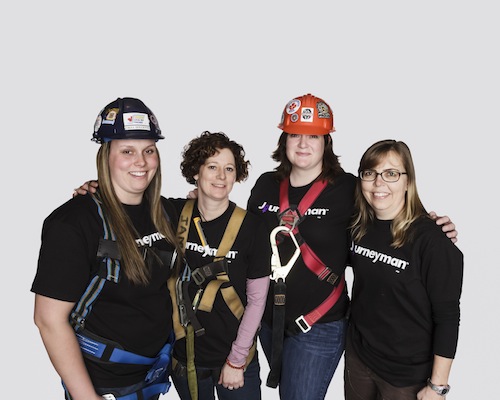Joann Greeley was 35 when she moved back to her home province of Newfoundland. She held a series of office jobs, but couldn’t find work that matched what she was making in Ontario.
That’s when she got the idea to go into the skilled trades. The daughter of an electrician, she signed up to become an electrical apprentice.
“I actually didn’t think I would run into any issues,” Greeley said about entering a predominantly male occupation, as the only woman in the classroom of 17 students. “I’ve always considered myself a tomboy. I was always around construction growing up and I loved building things.”
Then she tried to find a job. “I contacted every electrical contractor in St. John’s and none of them returned my calls,” she said.
Greeley asked a male friend to call up the same contractors. The employers usually called back right away to offer him the position.
And when she finally got onto a worksite, verbal harassment was all too common.
That was 10 years ago.
Despite the obstacles, she stuck with it and became a member of St. John’s Local 2330, and has worked on numerous construction projects throughout Atlantic Canada. She’s also a certified Red Seal electrician, the highest professional standard in the industry.
A lot has changed since she first started in the trade – mainly for the better, Greeley said. “I’m seeing more and more women on construction sites, and we’re becoming accepted by our male co-workers.”
 |
| Journeyman is a Canada-wide organisation committed to attracting women to the building trades. IBEW representatives to the group are, from left, St. Catherines, Ontario Local 303 member Calli Doucett; St. John’s, Newfoundland Local 2330 member Joann Greeley; Kitchener, Ontario Local 804 member Jennifer Pigozzo; and Vancouver, British Columbia Local 213 member Lisa Langevin. |
Now her goal is to inspire more women to seek careers in the trades. Greeley is sharing her story with young people throughout Canada as a representative of Journeyman, a national program to promote, support and mentor women employed or considering careers in construction. The group was launched by Canada’s building trades unions in May.
“I have a niece, and I want her to think it’s not a big deal for her to join the trades,” she said.
The program is represented by 14 members of various construction unions, including the IBEW, Iron Workers, Boilermakers and Bricklayers.
“They all have different stories,” said Lindsay Amundsen, director of program development and operations for Journeyman of the program’s participants. “Some did a career switch, some are single mothers looking for a good job to support their families, some are apprentices.”
One of the organizers’ goals is to get into the public eye to help break down stereotypes about women in the trades by making appearances at high schools, charity events and career fairs while building media buzz about the program.
Journeyman and its representatives have already been featured in numerous newspapers and TV programs.
Program representative Calli Doucette never had the opportunity to talk with a female electrician before going into the trade. She says she wished she had. The third-year apprentice had been interested in construction technology since childhood, taking electrical classes in high school.
“I didn’t know any women IBEW members, but I knew I didn’t want to sit at a desk all day,” she said.
Guidance counselors tried pushing her to go to college, but Doucette was set on becoming an electrician. “It just made sense for me,” she said.
A member of St. Catherines, Ontario, Local 303, Doucette says although she’s one of the few female electricians in the local, she’s fully accepted by her male co-workers.
The biggest obstacle to women getting into trades is lack of knowledge, she says. “So many young people, men and women, are unaware that it’s a viable career option.”
This fall, Doucette plans to speak to students at high schools throughout the Niagara area.
Despite some progress in increasing gender diversity in construction, women still represent only 4 percent of the total industry workforce. And with Canada facing a looming skilled workers shortage as the baby boom generation retires, women represent an untapped workforce the country needs to keep construction projects going.
“More than 25 percent of the industry will turn over in the short to midterm,” said Canadian building trades chief operating officer Robert Blakely. “Women have the ability to change the template, the workplace and the norm.”
Two other IBEW members serve as Journeyman representatives: Kitchener, Ontario, Local 804’s Jennifer Pigozzo and Vancouver, British Columbia, Local 213’s Lisa Langevin.
“The most important advice I can give to women is to join a union,” Pigozzo said. “I don’t worry that men are earning more money than I am, because in the union we are treated equally.”
Langevin encourages women to not get discouraged. “Far too many women drop out early on because of a bad experience,” she said.
Greeley says that women aren’t looking for special treatment, just equal opportunity. “For me, feminism is about whether or not women have the same career opportunities as men when they get out of high school,” she said. “I never looked to be treated differently from the men on the job, just to have the same opportunity as everyone else to succeed.”
Go to www.journeymaninc.ca for more information.